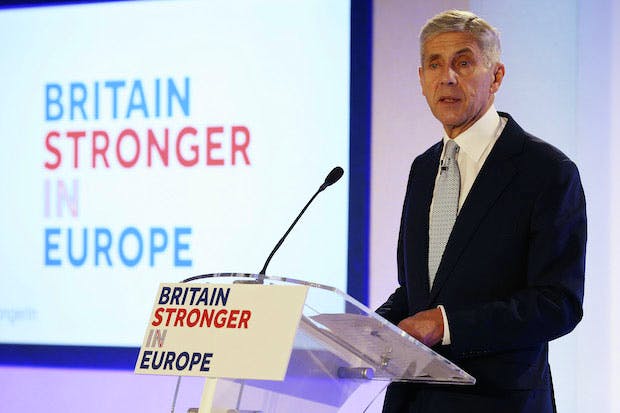David Cameron wants to get the European Union referendum over with quickly — and understandably so. Things are still going well for him, and his political opposition is in disarray. The ‘in’ campaign will draw heavily upon his personal authority and the public is not (yet) fed up with him. Ideally, he wants to start campaigning next month — and many of his allies are at it already. Opinion polls show a large number of undecided voters. So this may very well be a campaign where a great many are open to persuasion and hoping for a high-quality debate. They will have been disappointed so far.
The ‘in’ campaign has been up and running for months, and recently secured large donations from Goldman Sachs and other American megabanks. With such resources, we should be hearing fresh, high-quality arguments delivered with passion and elan. Instead, we have had the likes of David Lammy, a former London mayoral hopeful, telling us that a million Indians died during the second world war ‘fighting for the European project’. There certainly was a project to integrate Europe at the time, but it is one that Indians (and others) helped to thwart.
Then we have the tragicomic figure of Stuart Rose, who fronts the Britain Stronger in Europe campaign. He seems unable even to remember its name, bizarrely calling it the ‘Better Stay in Britain’ campaign. It was shocking, but not surprising, to hear that he had not bothered to marshal even the most basic facts. What’s worse is to find out that BSE (to use its unfortunate acronym) had not bothered to carry out proper research itself.
It has been making two main claims: that EU membership is worth £3,000 a year per household and saves the average person £450 a year through lower prices. One source is supposedly a 2013 ‘study’ by the Confederation of British Industry — which turns out not to be a study, but an exercise in cherry-picking other pieces of research. The £450 figure can be traced to a European Commission publication, which, in turn, came from a American paper called ‘Globalisation and the Gains from Variety’ — an attempt to quantify the benefits of -globalisation to American, not European, consumers.
How can a well-funded campaign like Britain Stronger in Europe have resorted to such a cavalier use of statistics? Disregard for the facts is, alas, a character trait of many of the most fervent pro-Europeans. In 2011, Nick Clegg, then deputy prime minister, made another claim which has been parroted by the pro-EU camp: ‘There are three million of our fellow citizens, men and women, in this country whose jobs rely directly on our participation [in the EU].’ This figure was derived from a ten-year-old study which simply totted up jobs in businesses that export to the EU. Is anyone supposed to believe that all trade between us and EU states would cease if we voted to leave?
But this is what the ‘in’ campaign is suggesting: contrasting EU membership with a made-up world in which Britain would suddenly mean nothing to anyone on the Continent. This scenario only serves to insult voters’ intelligence. If we vote to leave, the rules are clear: nothing would change for at least two years while a new trade deal was negotiated. This would hardly mean all trade ceasing. Far from it. The rest of the EU would have an even stronger incentive to negotiate a deal than we do, given that they export more to us than we export to them — £19.2 billion worth of goods against £11.1 billion in November last year, for example.
The choice facing Britain isn’t -whether or not to trade with Europe. It is a question of how we trade with Europe. Do we continue with the status quo, under EU rules and with all of its notorious frustrations? Or do we try to negotiate another trade deal, as Norway and Iceland have done? If we do the latter, then the jobs reliant on European trade will still exist.
The question — and it’s a tough one for the ‘out’ campaign — is whether the new deal with Europe would be much better. Would we pursue an expensive Norway-style relationship, or a Swiss one that doesn’t include free trade in services? It would depend on -whoever leads our exit negotiations, which would depend on who succeeds David -Cameron — he is expected to resign if Britain votes to leave.
The problem is that many of those involved in Britain Stronger in Europe also once campaigned for Britain to join the euro. They made all manner of claims that have since been disproven. It was easier to bluff back then. In the digital age, dishonest figures can be rumbled quickly. This is why this time last year George Osborne had to abandon his false claim of having halved the deficit.
Until recently it seemed unlikely that Britain would vote to leave the EU. But then, for a long time, nobody thought Scotland would vote for independence. In that referendum, the ‘no’ campaign was caught napping, and the vote turned out to be much closer than expected. This year, the ‘in’ campaign has made a similarly lazy and unconvincing start.
Got something to add? Join the discussion and comment below.
Get 10 issues for just $10
Subscribe to The Spectator Australia today for the next 10 magazine issues, plus full online access, for just $10.














Comments
Don't miss out
Join the conversation with other Spectator Australia readers. Subscribe to leave a comment.
SUBSCRIBEAlready a subscriber? Log in